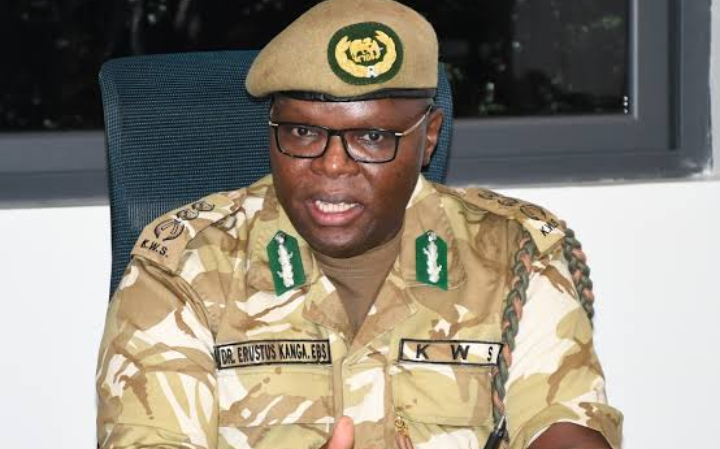The Kenya Wildlife Service (KWS), a cornerstone institution in Kenya’s conservation efforts, has found itself at the center of controversy since the appointment of Acting Director General Erastus Kanga.
Reports of corruption, mismanagement, and political interference have clouded Kanga’s tenure, sparking public and governmental calls for accountability and reform.
Accusations of unethical procurement, favoritism in hiring, and undue political influence have raised concerns about the integrity and effectiveness of KWS under Kanga’s leadership.
One of the most concerning issues has been alleged corruption within KWS’s procurement processes.
Following Kanga’s appointment, there were immediate reports that he began meeting with vendors and demanding “commission fees” as a prerequisite for awarding KWS contracts.
This alleged kickback scheme has raised questions about financial integrity within KWS, with critics suggesting that these fees have become a gateway for preferential treatment rather than merit-based contracting.
According to insiders who confirmed to leaked.co.ke, these demands for kickbacks have obstructed KWS’s operational efficiency by diverting resources away from essential conservation initiatives and towards private interests.
Conservation projects, which are vital for Kenya’s environmental heritage, are allegedly being sidelined to cater to these financial demands, undermining the institution’s mission and tainting its reputation.
Beyond procurement, the culture within KWS has also reportedly suffered under Kanga’s leadership due to accusations of discriminatory hiring practices.
Recruitment processes under his administration have allegedly favored particular ethnic groups, with claims that appointments have disproportionately benefited individuals from the Kalenjin and Kikuyu communities.
This skewed hiring approach has triggered discontent and concern over a lack of regional diversity within KWS, which ideally should reflect Kenya’s multi-ethnic society.
In response to these allegations, the National Assembly’s Committee on National Cohesion and Equal Opportunity has reportedly shown interest in investigating the agency’s hiring practices to determine if they meet standards of inclusivity and fair representation.
This growing concern suggests that KWS’s internal operations are increasingly viewed as inconsistent with the principles of equality.
Another layer of controversy surrounds Kanga’s alleged connections to influential political figures, including ties to President William Ruto’s family.
These connections have reportedly enabled Kanga to maintain his position despite rising allegations and dissatisfaction with his administration.
Sources within KWS indicate that Kanga’s political alliances have created a protective buffer, allowing him to operate with minimal accountability.
Employees have described an atmosphere of intimidation, where questioning leadership decisions or raising concerns about irregularities may invite retaliation.
This climate has allegedly contributed to a culture of silence and compliance, limiting internal checks and fostering a sense of impunity among the top leadership at KWS.
The mounting allegations against Kanga have prompted widespread calls for investigations by the Ethics and Anti-Corruption Commission (EACC) to address these reported issues within KWS.
Public frustration over KWS’s trajectory under Kanga is compounded by concerns about Kenya’s wildlife and natural resources being compromised due to institutional mismanagement.
As the public and conservation stakeholders grow increasingly dissatisfied, there is a broad push for transparency, accountability, and urgent reform within KWS.
The demand for oversight reflects a desire to protect Kenya’s wildlife and environmental legacy from being further undermined by alleged corruption and mismanagement.
The pressing need for accountability within KWS has become a focal point in the national conversation, as citizens look to the government and anti-corruption bodies for concrete actions to restore integrity within this vital institution.

